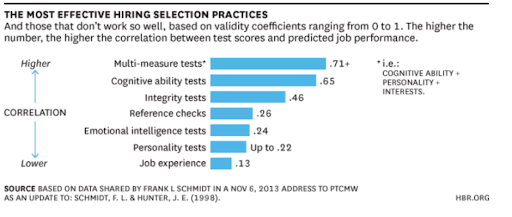
Most companies today focus on hiring the right talent for a given job. While companies invest a lot in background checks and getting the structure of the interview right to find the right talent, many tend to miss out on using a data-driven approach for their hiring process. Here, in this article, we present some key points to practice when hiring.
First and foremost is to set up a robust job description. Along with the basic roles and responsibilities that go into the job, take time to analyse how this role is going to grow within the organisation a few years down the line. This way when the candidates are asked about what their career growth looks like, as an interviewer one can ascertain if the growth of the job and the growth that the candidate has in mind are aligning.
What we often fail to do when creating a job description is to assign the right skills required for the job. Of course, we like to put down certain skills that are commonly known under the knowledge and expertise required but each job has its skillset that makes it unique. Generally, a combination of both hard skills and soft skills are required for a given job. But depending on the job, one type of skillset may be more important than another. For instance, a salesperson, human resource personnel or a customer-facing role usually require soft skills more than hard skills. Programmers and mechanics, on the other hand, may not need advanced soft skills to do their jobs well. Therefore, assigning the appropriate skills becomes crucial while creating the job description.
Second, prioritise soft skills as equally as hard skills during the interview. Often we focus on hard skills, and the technical round is given more priority when hiring an individual for a particular job. Hard skills become meaningful when soft skills are present. For instance, a doctor must be proficient in examining a patient and giving the right diagnosis but if the doctor is also approachable, friendly and answers the patients queries and clarifications, then one would feel more comfortable visiting that doctor than an unapproachable one who only carries out their duties. Hence, take time to understand and interview the candidates on their soft skills as well - have a separate round that measures just the soft skill just like how we have the technical round. Now the question that can come up is, “I know how to ask questions for the technical round but how do I go about assessing the soft skills required for the job? How do I frame my questions?” Well, when it comes to soft skills, we may think that we can just go with our gut feeling on what the individual might be like from how they respond but we are dealing with an individual’s personality, and therefore backing it up with data is crucial! So, how can we do that? By using psychometric tools that measure it for us.
This now brings us to our last point:
Data-driven hiring. Varied psychometric assessments like personality tests (eg. PROFESSIONAL PROFILE 2), cognitive ability tests (eg. Reasoning/Logical) or career interest tests (eg. VOCATION) can give insight into the personality, skills and interests of the individual which in turn will help in understanding where the candidate is with regard to a particular soft skill. A test like PROFESSIONAL PROFILE 2 will give insight into various soft skills like - is the candidate outgoing and likes to be social and interactive, or if one is open-minded and adjusts to change easily, or if one is able to convince and strategically influence people around them, and so on. While it will be great to have employees that demonstrate all the soft skills there are, it’s unrealistic! Therefore, be role-specific. If we are hiring a software developer and the role doesn’t require having skills that need the individual to be convincing or strategically influencing people, then don't attach importance to that particular skill; instead, base your questions around skills that matter from the assessment for the role.
For example, say the role requires the candidate to be open to trying new things, then ask questions on when was the last time they tried doing something differently, or how they would react when a novel approach needs to be adopted. In this way, we can align the personality of the individual to the requirement of the particular skill from an organisational point of view. From a research conducted by Frank Schmidt, it was found that personality assessments only correlate to right hiring at 0.22, and that is why a a multi-measure assessment or a multi-criteria approach where we combine interviews with various other measures is one of the best approaches to hiring, as shown below:

While we talk about backing interviews on soft skills with validated psychometric tools, the same applies to hard skills as well!
Along with aptitude and personality tests, we can use job-specific skill tests. Yes, we will have experts in the field who will ask questions related to technical aspects of the job, but to reiterate - when those questions are backed by data, it will be so much more valuable! For instance, if the software developer had to be proficient in Java, using a test that measures their proficiency in Java, and with the scores obtained from that particular test, discussions with the candidate can be had to understand how they might be proficient in that skill.
To conclude, data is taking predominance in all aspects of the workplace. Being able to make the best use of data-driven scientific tools that help us ascertain the right skills for a job will make our hiring process foolproof. It will also help us avoid selecting a candidate based on our gut feeling because we know at the end of the day, hiring is a time-consuming process and if done the wrong way then the cost, time and resources wasted need not be mentioned!
Need access to a range of psychometric / job skill measurements, have a look here!






